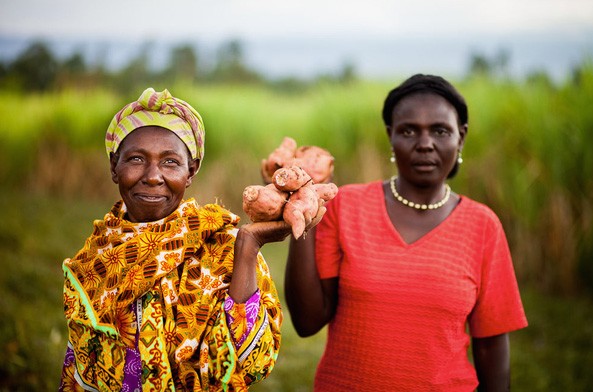
By Eric Postel, Associate Administrator of USAID and Assistant Administrator of the Bureau of Economic Growth, Education, and Environment; and Assistant to the Administrator for Africa.
We all know water is essential for human life. But we must not forget that it fuels all life. Water powers the crops we grow and the livestock we raise. Without it there are no fruits, vegetables, meat, or milk.
In my job at USAID, I provide oversight for USAID's Office of Water, which implements the Agency’s 2013-2018 Water and Development Strategy. The Strategy stresses the importance of managing water for agriculture in a more sustainable and productive way. This premise underlies our efforts to enhance food security through the U.S. Government’s Feed the Future initiative.
As Assistant to the Administrator for Africa I frequently travel to this region where food security problems there are particularly acute. Half of the population lives in extreme poverty, one-quarter is undernourished, and one-fifth endures severe water scarcity. Sub-Saharan Africa has the highest prevalence of hunger of any region in the world.
There are a number of reasons for this, but water is chief among them. Because most farms in sub-Saharan Africa are too far from rivers to make irrigation a sustainable solution, 95 percent of agriculture depends solely on the moisture from rain that is held in the soil. Rain-fed agriculture is a risky business – it depends upon rainfall that is becoming increasingly erratic due to climate change.
Staple food production is increasingly precarious, while Africa’s need for food is only rising. Its population is set to more than double by 2050 to almost 2.5 billion. Current agricultural systems will be unable to grow enough food to feed all of Africa’s people.
We cannot increase the rainfall across Africa, but we can improve how it is managed on farms. Restoring and maintaining the soil’s capacity to absorb the rainwater and more efficient management of the water stored in soils is integral to achieving the greater productivity needed to feed the hungry. In particular, we need to focus on water storage for supplemental irrigation (irrigation for critical periods in the crop cycle) to help Africans produce the food they need.
The Productive Safety Net Program (PSNP) in Ethiopia, one of our Feed the Future focus countries, is an example of a food security program that helps farmers adapt to unpredictable rainfall. The Government of Ethiopia, supported by a consortium of donors including USAID, began the program in response to recurring droughts and predictable lean periods affecting large numbers of chronically food insecure families. The public works projects implemented in the PSNP program have introduced water harvesting, water catchment, and small irrigation systems and rehabilitated watersheds to restore water tables. Seven million Ethiopians per year benefit directly from the PSNP but the improved water management infrastructure from the public works benefits the entire community.
But what works in Ethiopia will not necessarily work elsewhere in Africa. Although the entire continent is plagued by flood-drought cycles, the equatorial belt sees high rainfall while the north, south, and horn are arid or semi-arid. And in each place we go, there are different governments, economies, and cultures that influence how best we can partner and support programming.
USAID is investing in research and demonstrations to learn the right solutions for each local situation. The Agency-supported Feed the Future Small-Scale Irrigation Innovation Lab sets out to learn the best techniques for small-scale irrigation and combine them with conservation agriculture and drip irrigation for the best results. The Africa RISING project collaborates with this Innovation Lab on irrigation and rain-fed systems with a variety of stakeholders across the region.
There is no one-size-fits-all solution. We must consider all the factors and stakeholders to understand what people and their crops need to thrive. We do, however, know that if we don’t address water management, we will fail. By connecting water, food, and development, we have a fighting chance to end hunger in Africa.







Comment
Make a general inquiry or suggest an improvement.